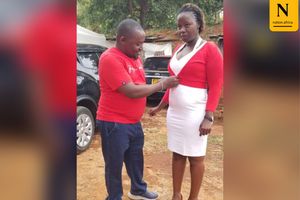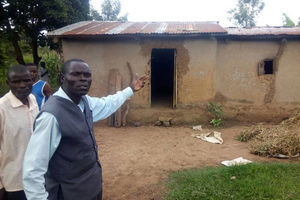
A six-month-old baby is among six people killed by suspected clan militias in Banisa Sub County in Mandera County.
The relationship between Mr Nicholas Koskei and his wife Rhoda Mumbi was blossoming in 2017 but their marriage had its own share of troubles.
Perhaps if they had succeeded in resolving their differences, which included infidelity suspicions on the part of Mr Koskei, this story would not have been necessary.
The lovebirds had stable jobs at the United Nations, Nairobi, but beneath the facade of flourishing romance was a well-hidden plot by Mr Koskei to kill Ms Mumbi.
On July 8, 2017, he took her for a night out at Jacaranda Lake Elementaita Lodge in Gilgil Nakuru County.
Ms Mumbi probably thought the trip was out of their blooming love. But it later emerged her husband intended to kill her outside their home and create a story claiming she was a drug addict and that the death occurred following an altercation concerning substance abuse.
The wider scheme also involved an attempt to influence a pathologist to alter the post-mortem result to clear him.
Their relationship had started a few years earlier at the UN. He also said that he had helped Ms Mumbi in her education.
One witness painted to court a picture of a happy couple while another said the marriage had started hitting rocks after Mr Koskei began arriving home in the wee hours. Ms Mumbi confronted him suspecting he had an affair.
Mr Koskei called the hotel three days earlier, booked a double room and paid for it. He insisted that he wanted a room that had a bathtub, saying his wife liked to bathe in one. Ms Mumbi also called her sister asking her to stay with their children as she travelled.
Upon arrival at the hotel at about 3.20pm on the fateful day and checking in room number 17, Mr Koskei posted photographs of them at the family WhatsAPP group with greetings.
After settling in, they went to the pool where Mr Koskei ordered two bottles of beer while his wife declined to take alcohol.
Later at 6:45pm, they proceeded to their room and at 9:00pm Mr Koskei pulled off his intended scheme by strangling his wife and then carefully putting her in the bathtub.
He then left the room and shut the door, on the pretext that he was going for a jog and to order some food.
After being out for a while, he notified the hotel reception that his wife was not answering the phone and that the door to the room was locked. With the help of hotel staff and security personnel, he returned to the room to find his wife dead in the bathtub.
“At around 9.30pm I met Mr Koskei at the terrace door. I asked him if they were ready for dinner but he said he had been jogging. He appeared to be sweating and breathing heavily and was wearing a grey t-shirt and blue jeans. I left him and went into the restaurant. I returned to find him in deep thought, his hands folded. He said he had tried to call his wife but she was not responding,” narrated the hotel’s waiter Ambrose Mapesa.
Testifying in the court trial, Mr Mapesa said upon opening the room’s door with the spare key, Ms Mumbi was found lying in the bathtub naked. Mr Koskei has since been found guilty and is awaiting sentence.
According to the witness, there was no smell of any soap scent, and the bathmat and the bathroom floor were dry. The bathtub was half-full with clear water.
Beside her head was a glass with a substance in it and also a quarter-full bottle of Bailey’s. From her mouth, there was a white substance oozing out.
“Mr Koskei went into the room, pushed the bathroom door open and peeped in. He immediately came out of the room with his hands on his head. Then he went down on his knees saying that the wife had collapsed in the bathroom,” another witness, Dalmas Kairish, a security guard at the hotel, narrated.
Mr Koskei asked the guard to check if she was breathing. He had also asked if there was a doctor at the hotel. The security guard even helped to steady him from falling due to the ‘shock’ and then helped him onto a chair.
At 2am Mr Koskei called his wife’s cousin Robinson Kirimi informing him that there had been an accident in Gilgil and Ms Mumbi had died. He did not tell him the nature of the accident.
“Mr Koskei and Mumbi had generally had a good marriage. Until the last year of her life when it was a bit rocky. They had some arguments since Mumbi suspected that Mr Koskei was having an affair,” said Mumbi’s sister Jessica Kagwiria.
After police arrived at the scene, Mr Koskei was very restless, pacing about the room. According to Inspector of Police Rita Wanekaya, he would stand up, sit down, walk about and sometimes sleep on the bed head covered as police secured the scene.
Once the autopsy was conducted, the cause of death was found to be asphyxia due to mechanical strangulation. The pathologist noted the absence of defensive wounds, meaning that Mumbi did not fight back.
The autopsy was led by Dr Dorothy Njeru, a government pathologist, although both the families (for Mr Koskei and Mumbi) had each hired a pathologist to participate in the post-mortem examination of the body.
According to Dr Njeru, it was not possible to self-strangle because the loss of air would eventually result in a loss of grip. She stated that in her 15 years experience, she had never come across self-strangulation.
Once they were all back in Nairobi, as they prepared for the post-mortem scheduled for Tuesday, July 11, 2017, Mr Koskei contacted another family member, Dr Isaac Micheni asking for an urgent meeting.
Mr Koskei inquired if Dr Micheni knew the pathologist who was scheduled to perform the post-mortem.
In the meeting, Mr Koskei stated that his wife had become addicted to drugs prior to her demise and this was a source of conflict in the marriage.
False information
Mr Koskei wanted to confirm if the drugs would appear in the body system during the post-mortem. Dr Micheni testified that Mr Koskei told him the information he had given the police was false to save Mumbi's reputation and cover her from the issue of drugs.
Mr Koskei went on to say that he and Mumbi had a physical altercation and he might have roughed up her neck. He claimed that they fought the drug problem, which prompted him to leave the room to cool off.
When he returned, he said he found a needle stuck in her arm and she was dead. So he said he set up or stage-managed the whole scene for the sake of the dignity of the family. At that point, Dr Micheni told Mr Koskei to stop talking.
According to Dr Micheni, the accused gave two different stories; one at the hotel and the other at Mr Barnos’ house.
“The whole scenario did not add up because I had never heard about Mumbi and drugs before. I knew her as a staunch Christian. The second story also had elements of falsehood,” said Dr Micheni.
To pin Mr Koskei to the murder, Police Sergeant Alice Monari testified that Mr Koskei was the last person seen with his wife, the hotel room they had booked was locked with a key and there was no sign of breakage or intrusion into the compound of the hotel.
During the trial, the court visited the scene, and it was found that Mr Koskei locked the door when he left the room. He confirmed the same in his testimony.
“The accused locked the door, yet he still insists on making up a story that the door locked itself,” said Justice Richard Mwongo.

Justice Richard Mwongo.
According to the judge, the prosecution adduced evidence that showed planning by the accused to kill his wife during the trip.
“He alone made the reservation, made sure to ask for a room with a bathtub while volunteering, unprompted, that his wife liked to take baths. He admitted to setting up the scene of crime to save his wife's reputation. He sought to influence the post-mortem, asking to be told the doctor who would conduct the post-mortem,” said the judge.
“Further, the accused brought drinks from outside the hotel which were used in setting up the scene of crime. The drinks were not bought from the hotel as the only alcoholic drinks the hotel served the accused were beers”. Mr Koskei is awaiting sentencing at the High Court in Naivasha.
His case and circumstances are not unique. A former student at Egerton University, Alex Dimba, is serving a 30-year imprisonment for killing his lover Mirriam Njoki at a hotel room in Mount Sinai Lodge Nakuru Town.
He had also attempted to pull a cover-up, by using a false personal identity to book the hotel room where he intended to kill her. He would later claim that he was under the influence of alcohol and his decision-making may have been impaired.

Alex Dimba. He is serving a 30-year imprisonment for killing his lover at a hotel room in Mount Sinai Lodge Nakuru Town.
It was on February 21, 2008, when Dimba took Mirriam for a night out at the hotel. Both were students at the university at the time and on the material day, it was the opening day for that semester.
He took her to the hotel and booked room number 22 where they were to spend time together. Court papers show that at the time of the tragic incident, they had been in an intimate relationship for five years and that Dimba was newly married to another woman, yet he carried on the relationship with Njoki.
The following day at 8am Dimba left the room, went and paid for it. However, he did not surrender the keys saying that he was going for tea and would return and that he had left his luggage there.
He never went back. Five days later one of the hotel cleaners noticed a foul smell coming from the room. The hotel owner was called, and he notified the police, who broke into the room, only to find Njoki lying in the bathroom, dead, naked, with a wire around her neck.
Strangled
The post-mortem examination showed that she had been strangled. There were two empty bottles of vodka in the room. When investigations commenced as to who the killer was, it turned out that Dimba had used the personal identity details of another student named Charles Ndenga to register at the hotel reception.
However, investigations led to him, and eventually his father handed him over to the police.
"The prosecution is right. Dimba demonstrated malice aforethought and a calculating mind to kill in the manner in which the offence was committed. He booked the room under a false name using the identity card of a person he knew was innocent. This paints a picture of a person who planned the death of the victim and planned to get away by creating a fall guy," said Justice Teresiah Matheka while sentencing Dimba in January 2022. At the time Njoki was aged 24 years and Dimba 26.
On alcohol, the judge said: "When he booked the room, using a stolen identity card, when he left Njoki dead in the bathroom, when he lied to the person at the reception that he was just going for tea, he was not under the influence of alcohol".
While he alleged remorse, the judge noted there was no evidence of any effort having been made to reach out to the family of the victim.
In Bomet County, Obadia Chepkwony is serving 10 years in jail for killing his lover Mercy Chepkoech on March 6, 2019 at a hotel in Silibwet township.
He was sentenced in October 2024 by Justice Roslyne Lang'at-Korir following a plea bargain with the prosecution.
He pleaded guilty to the lesser charge of manslaughter. According to the plea agreement, Chepkoech operated a small business of selling potato chips to sustain her life.
Rotting body
On the fateful day, he and Chepkoech were seen entering the hotel and were never seen again until two days later when the hotel management decided to break the door to the room in order to book it for another customer.
To the consternation of the hotel caretaker, the rotting body of Chepkoech was discovered covered with a blanket on the bed. Chepkwony was nowhere to be seen.
The cause of death was established to be manual strangulation.
The court heard that while drunk, the pair had a romantic fallout which escalated into a fight leading to the death. He said the assault was not premeditated.
"There is no doubt that the accused was remorseful and that there were steps taken by his family towards reconciliation with Chepkoech’s family according to their tradition. I have however taken into consideration the fact that the accused lacked a proper supportive structure for non-custodial rehabilitation. It is my view that he would benefit more from custodial rehabilitation," said the judge in the sentence ruling.









